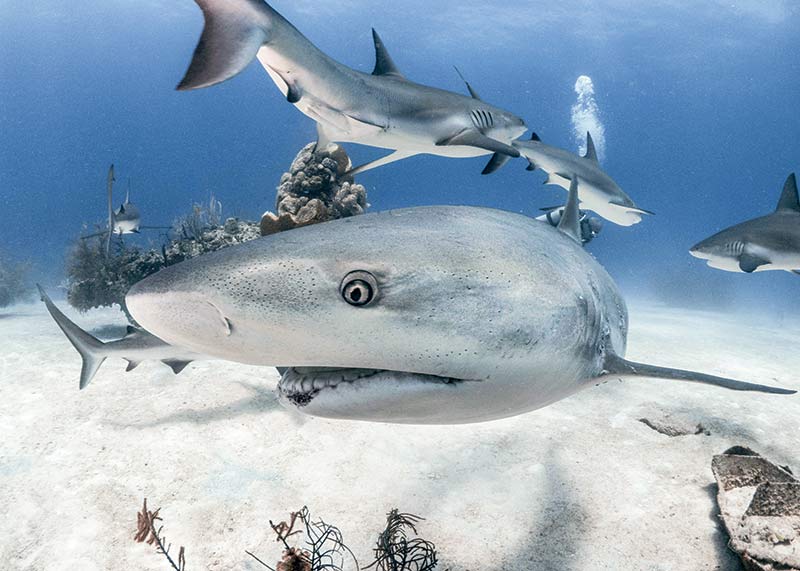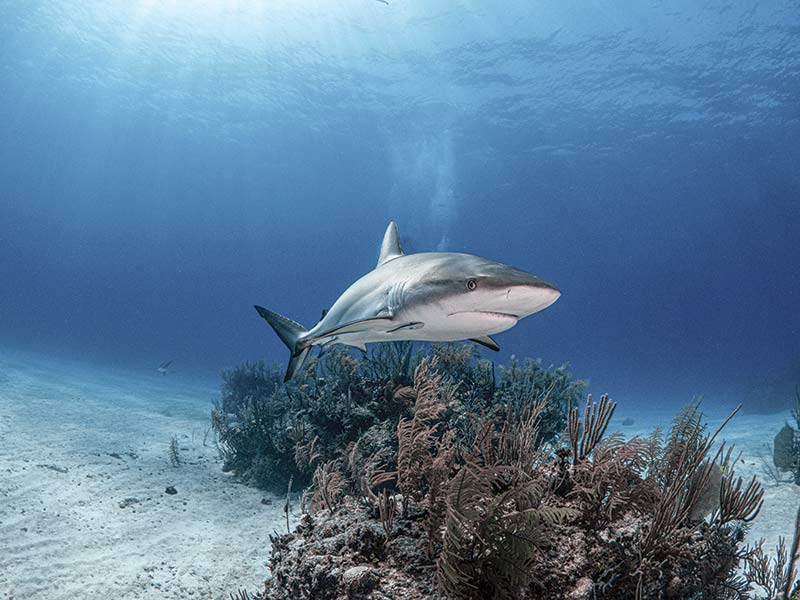How to overcome Galeophobia

Photos: Cristina Zenato
By Cristina Zenato
If every time we are at the beach the soundtrack of ‘Jaws’ plays in our head, we may be suffering from the fear of sharks. This fear might not be triggered by an actual event or a specific experience; it could be triggered by a movie, news report, or even some TV programs offered for our entertainment.
While numbers prove that it’s more likely to be crushed by a vending machine or a falling coconut than being bitten by a shark, we are more terrified of sharks than coconuts. Simply hearing the word causes some people to tremble, terrified by the thought of how sharks could kill us. Our distant ancestors had much to fear in life, and some of the fears that guaranteed their survival were transferred into us. The idea of being eaten alive by a shark is a scary way to die, no matter the rarity of such an occurrence. While our fear is not entirely irrational, for many, the emotional response is greater than the probability of a shark bite.
Most of the time, a fear of sharks comes from our relation to this world and nature in general. Humans have been successful in conquering terrestrial environments; we find water in the desert, create heat in shelters made of ice, and manage through the harshest of landscapes. Not so in the ocean; there, we have no power, no tools to use to our advantage, no capability to bend nature to our use. We cannot see, breathe, or move efficiently. Even in the warmest of waters, we would suffer from hypothermia after a few hours. If we were stranded in the middle of the ocean, we could not take a breath and huddle by a coral head to weather the night. We have no control over the vastest part of our planet; the perception of sharks as formidable predators with multiple rows of teeth is the ultimate representation of our loss of control. We are more afraid of what sharks represent in our subconscious than the actual threat they present to our physical person. Most of all, we’re scared of losing control. The chances of you being eaten alive by a shark are highly improbable. We are more likely to die from lightning strikes, car crashes, cancer, or heart disease. Our brains cannot register that only one in every 11 million people in the world going in the water is at risk of being bitten—not eaten, just bitten—by a shark. The reality of the events is irrelevant; a large number of us think of ‘attack’ as soon as we hear the word shark. So how do we overcome this sensation we feel every time we hear that word?
The key to overcoming the fear of sharks lies in understanding the reality of the situation and managing different circumstances.
Open mind
The first action is to be willing to change our rooted beliefs. We need to consider that our thought patterns might be incorrect. It’s time to question what we have heard about sharks and do our research, thinking critically and rationally. This change requires ditching some of the self-preservation instincts we still harbour inside us. We need to step out of our comfort zone and consider other perspectives. I believe there is value on the internet. There are numerous positive accounts of people who dive, work, research, and interact with sharks. Following the daily life of individuals who are comfortable and share the reality of being in the water with sharks will help open our minds to the truth about sharks. Open-mindedness involves asking questions and being active in searching for information that challenges our beliefs. That action transfers into knowledge.

Knowledge
Once we start reading about sharks, we will learn that there are over 520 species and most of them are not large predatory animals; they feed on small or medium fish, mollusks, plankton, and other sea creatures. The smallest shark in the world, the dwarf lantern shark, is the size of a pen; the biggest, the whale shark, is the size of a bus and feeds on plankton.
With fossil records of over 400 million years, sharks have outlived the dinosaurs. While our ancestors appeared on this planet about 5 million years ago, it was not until 40,000-year BCE that we took to the sea for fishing. From an evolutionary point of view, we are not on the sharks’ menu.
Once we understand the vastity of the shark species, the next step is to learn which species live in the area we intend to visit. We should understand their basic behaviour, hunting, and feeding styles, and how it relates to our presence in the water.
The activity we conduct has perhaps the greatest influence on the species we may encounter. There is a difference between being on scuba (wearing a lot of gear, producing a lot of noise), surfing, or going spearfishing (the last is the action that likely may attract the most attention from sharks in some areas).
The species of sharks and our activity correlate to the circumstances in the location. The behaviour of these animals changes, depending on water conditions and visibility. Ultimately there is no one answer for all the instances we will be in the water; it’s our responsibility to mitigate our fear with the understanding of the situation; to do so, we need to put in some work. Ask the local people, professionals in the area, and seek direct guidance if uncertain. Knowledge is the natural step towards the next level of overcoming our fear: experience.
Experience
The next step in conquering our fear is to face it. Nothing can help us understand and appreciate sharks more than sharing their world. There are numerous places where we can have beautiful shark encounters as divers, swimmers, and snorkellers.
Entering the water with these fantastic creatures is life-changing for most people. I have seen it help overcome their phobia through
the years.
Watching sharks as they swim peacefully, inattentive of our presence, is an eye-opener to the unfounded fears deeply rooted in our minds. We can decide to start with species we find more innocuous, such as a nurse shark or a whale shark. They are still wild animals and, as such, deserve respect. Riding the dorsal fin of a whale shark or grabbing a nurse shark because we think of them as ‘docile’ is not action that will encourage a positive experience. In my previous columns, I explained how to pick an operator for safe shark diving and prepare for a shark trip; those steps help reduce the level of anxiety we may feel approaching an encounter we fear, yet are looking forward to experiencing.
Final thoughts
The oceans belong to the sharks and other creatures living in them, and at the edge of their contact with our terrestrial world, we are the guests. They are not invading our space; they live there.
Furthermore, sharks are the vital guardians of different ecosystems; they supervise the health of oceans by eliminating sick, dying, dead individuals. They promote the sustainable balance of the creatures they monitor, which avoids overpopulation or over-concentrations. The oceans regulate the health of this planet; we need them so that we can live healthily, and as a direct consequence, we need sharks to guarantee the balance. Understanding sharks is a vital necessity.
Cristina Zenato is a member of the Women Divers Hall of Fame, The Explorers Club, and the Ocean Artists Society. She has been diving with sharks for the last twenty-five years and has been instrumental in pushing forward an image of sharks that shows their real nature. For more on Cristina visit: www.cristinazenato.com







